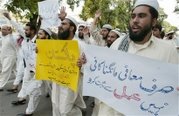White House offers revised CIA interrogation plan

By Vicki Allen Mon Sep 18, 6:53 PM ET
WASHINGTON (Reuters) - Seeking to quell an uprising over its legislation on the treatment of foreign terrorism suspects, the White House on Monday offered a revised plan to three Republican senators who charge that its bill would subject suspects to abusive interrogations and unfair trials.
"Our commitment to finding a resolution is real and that's why we're going to be sharing some language because we are eager to find a resolution," White House spokeswoman Dana Perino said.
Republican Sens. John Warner, John McCain and Lindsey Graham were to get the latest proposal on
President George W. Bush' name=c1> SEARCHNews News Photos Images Web' name=c3> President George W. Bush's bill, and were expected to comment on it on Tuesday, said John Ulyott, Warner's spokesman.
While the senators had several differences with Bush's plan, an administration official said the new proposal dealt only with the main sticking point of Bush's demand that Congress more narrowly define protections for prisoners under the Geneva Conventions.
Bush insists this is necessary to get information from "high-value" detainees, while the senators said it would allow interrogations that violate international standards.
Meanwhile the House of Representatives postponed to next week a vote on Bush's bill as Republicans tried to avoid a showdown that could derail Republicans' efforts to depict themselves as stronger than Democrats on fighting terrorism before November 7 congressional elections.
Bush, who has come under fire for harsh treatment of detainees at the Guantanamo prison and abuses at
Abu Ghraib' name=c1> SEARCHNews News Photos Images Web' name=c3> Abu Ghraib prison in
Iraq' name=c1> SEARCHNews News Photos Images Web' name=c3> Iraq, needs Congress to approve a system to try suspects mostly picked up in the
Afghanistan' name=c1> SEARCHNews News Photos Images Web' name=c3> Afghanistan war after the Supreme Court struck down his original plan.
HOUSE WAITS
The House put off floor action to next week on Bush' bill "only because the Judiciary Committee requested an opportunity to review the criminal code provisions and habeas corpus provisions," said Kevin Madden, spokesman for House Republican leader John Boehner of Ohio.
But other Republican House aides acknowledged the delay improved chances that the White House could reach a compromise and avoid a potentially ugly fight on the Senate floor in which a group of eight or 10 Republicans joined by Democrats could defeat Bush's bill.
"We continue to look for a way to resolve differences between the two approaches," Ulyott said.
Senate Republican leader Bill Frist of Tennessee said he expected the issue will be on the Senate floor next week as Congress struggles to complete pending business before breaking at the end of the month to campaign in elections that will determine control of Congress.
Warner of Virginia, chairman of the
Senate Armed Services Committee' name=c1> SEARCHNews News Photos Images Web' name=c3> Senate Armed Services Committee, and committee members McCain of Arizona and Graham of South Carolina contend the latest plan would deprive defendants of basic rights and would permit
CIA' name=c1> SEARCHNews News Photos Images Web' name=c3> CIA interrogations using harsh methods that violate the Geneva Conventions' requirement for humane treatment.
The committee last week passed its own bill that, unlike Bush's plan, would give defendants access to classified evidence being used to convict them. It also would set tighter limits on use of testimony obtained by coercion.
The committee's bill also offers CIA interrogators some legal protections from charges of abuse, but rejects the administration's plan to more narrowly define the Geneva Conventions' standards for humane treatment of prisoners.
The three senators along with Maine Republican Susan Collins and all of the committee's Democrats voted for it, against the remaining Republicans who supported Bush.
Since then, Republicans Sens. Chuck Hagel of Nebraska and Olympia Snowe of Maine have gone on record backing the committee's bill, and several other Republicans have not committed to backing Bush.
(Additional reporting by Tabassum Zakaria)








